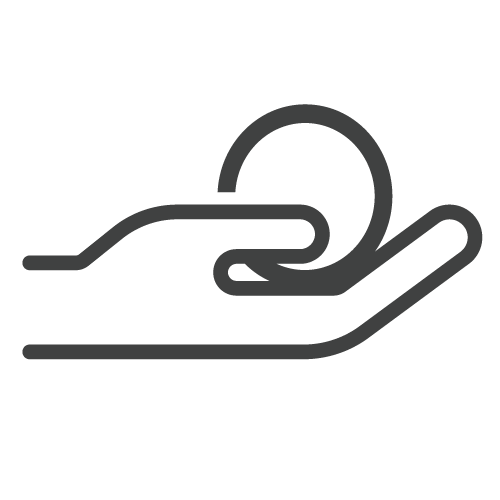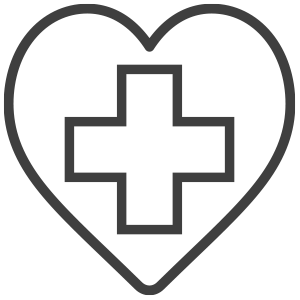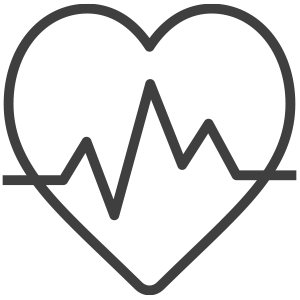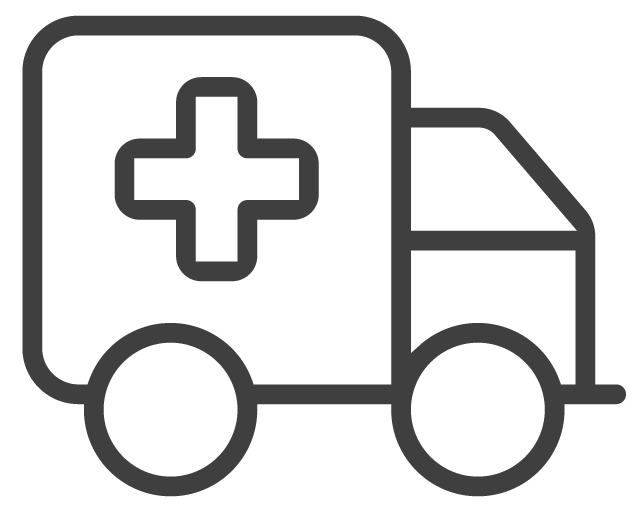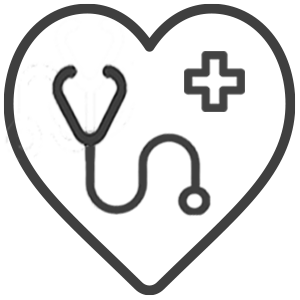shape our healthcare sector
become a future health pioneer
The main aim of our faculty is to offer modern courses of study that are geared to the current and future needs of the health care system and health sector. In addition, we want to give great importance, space and methodology to the important and often neglected cooperation of the different disciplines, i.e. interdisciplinarity and interprofessionality.
Prof. Dr. Christian Rester
the faculty at a glance
360 degree tour of the faculty
advisory board of the agw
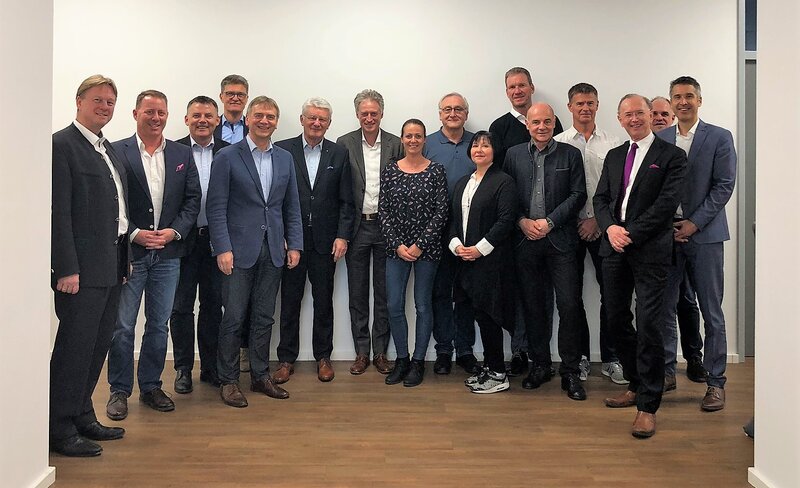
Altinger Marco: President of the Federal Association "Werteorientierter Mittelstand Deutschland e.V."
Baldus Angelika: Member of the Board of Directors of the German Association for Health Sport & Sport Therapy e.V. Federal Head Office Hürth
Bredl Christian: Head of the Bavarian Representation of the Techniker Krankenkasse
Brenninger Rupert: Occupational field and educational development nursing in the personnel division of medbo Regensburg
Helmel Norbert: Managing Director of the Physioklinik Mengkofen
Höß Markus: Headmaster of the Comenius Gymnasium Deggendorf
Knab Claudia: Nursing Director of the Landshut District Hospital
Prof. Dr. Melchart Dieter: Competence Centre for Complementary Medicine and Naturopathy at the TU Munich
Ortmann Hans: Chairman of the Physical Therapy Association of the Landesgruppe Bayern
Staudinger Anton: Management of the TCM Clinic Bad Kötzting
Dr. Trips Tobias: Senior physician at the clinical centre Traunstein
Dr. Weber Andreas: Director of Prevention of the Professional Association for the Public Sector
Zellner Theo: President of the Bavarian Red Cross
learning and transfer centre (ltz)
The Learning and Transfer Cenrte is a place to provide practical training, further education and continuing education using the latest technologies and the implementation of pedagogical methos. The learning locations vocational school for nursing professions, practice and university can be optimally combined here. Not only can nursing skills be practised in the learning environment, but highly complex nursing, care and emergency situations can be simulated in detail. The students can be optimally prepared here for the increased demands of professional practice.
The Learning and Transfer Centre is also available to the students of the bachelor's degree course in nursing care dual outside the simulation times in the form of "free practice" under the supervision of tutors. However, the doors are also open to students of other courses of study, such as physiotherapy dual, nursing pedagogy, etc.
Skills training involves the practice of certain skills, in our case of a nursing or medical nature (e.g. the placing of a stomach tube under hygienic and nursing conditions or cardiac massage in the context of resuscitation).
In a simulation, not only a specific activity becomes the focus of the training. Communicative and environment-specific factors also plan an important role here and thus correspond to the real requirements of complex nursing practice.
The video and audio transmission is made to the adjacent control room, from where the teacher can follow the scenario. The learners are alone in the Learning and Transfer Centre as in practice.
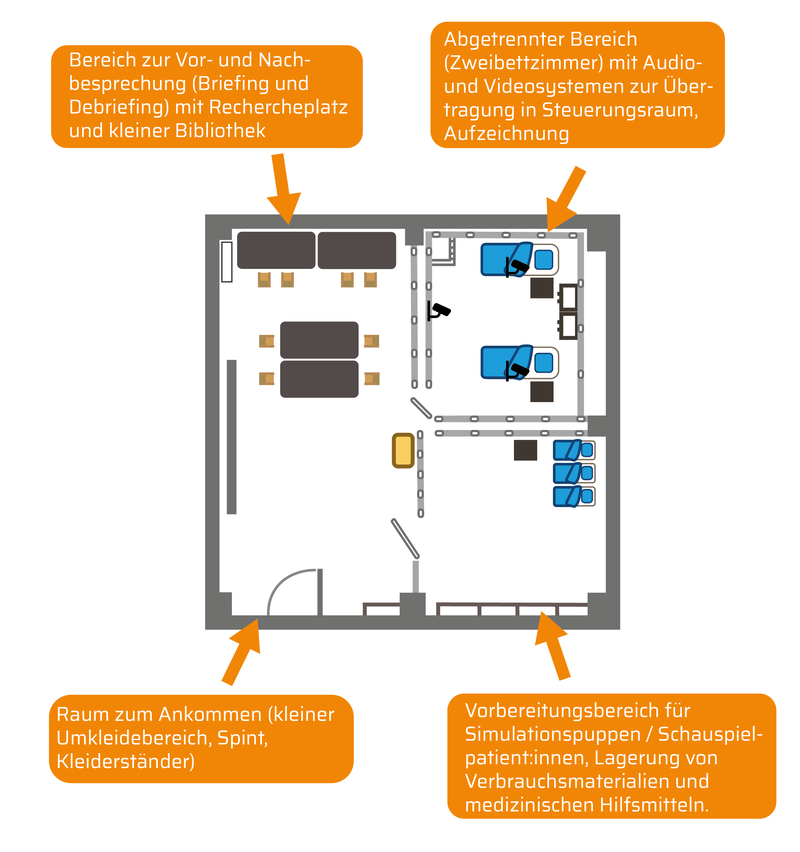
For the training in the Learning and Transfer Centre we use simulation dolls or acting patients, depending on the goals.
a. Simulation Dummies
To enable nursing skills training, we use the highfidelity simulation dolls, such as the Nursing Anne™ from Laerdal. On these manikins, learners can practice innvasive nursing and medical activities (such as placing a stomach tube, taking blood samples, catheterising the bladder, etc.) before performing these activities on patients.
For practicing emergency procedured and algorithms in the Basic Life Support course, the Mankins Resusci Anne™ and Resusci Baby QCPR™ are used. These allow a targeted and independently organised practice.
The highfidelity simulation dummy SimMan™ ALS is used for the application of simulations in the field of complex emergency training.
b. Acting Patients
In nursing simulations, special emphasis is places in the communication between learner and patient. For this purpose we use lay and professional simulation patients in order to be able to create a real nursing situation. After the simulation, these simulation patients provide the learners with valuable feedback which they can use in their everyday care.
Cooperations:
- DonauIsar Klinikum
Partner:
- Laerdal - helping save lives
- Kultur le muc - die Kulturzentrale
Networks:
- SimNAT Pflege
General Manager: Prof Dr Christian Rester
Contact person, nursing training division: Tanja Jänicke-Stöger
Contact person, emergency training in nursing: Heike Brandt
Laboratory Engineer: Hermann Schattenkirchner
Supporting teaching staff: Prof Dr Michael Boßle, Prof Dr Doris Eberhardt
Nursing Training:
"Learning with head, heard and hand" (Pestalozzi) is made possible for the students in the Learning and Transfer Centre.
In nursing training, the transfer of theory to practice plays a very important role in addition to sound specialist knowledge. Only through the transfer and application of the acquired knowledge can action competence be achieved.
In the Learning and Transfer Centre as a third learning location, students can simulate and experience different practical situations and patient cases in a protected environment. In this way, students are comprehensively prepared for the practical assignments, learned activities can be practiced on simulators and care situations can be simulated in order to link the contents from practical, school and unversity training.
Reflection on one's own actions as well as understanding the patient situation and the institutional and social framework play a very important role here. Through the active role of the students in the simulation as well as in the subsequent reflection, critical thinking is stimulated. Students perceive situations holistically and reflect on them, become open to the opinions and views of their counterparts and can recognise their own weaknesses.
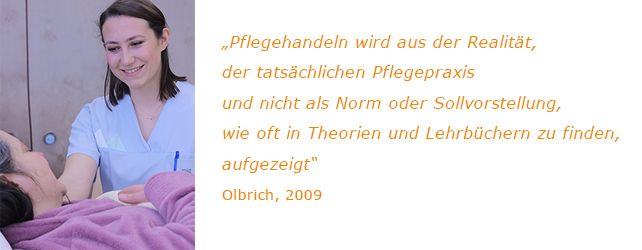
Each students goes through a Learning and Training Centre exercise in the first three years of study. For this purpose, students can register in groups of up to four people for an appointment in the LTC. The simulations are completed by 1 - 2 students, the preparation and post-processing of the exercises takes place in the group, so that difficulties that have arise, for example, can be discussed in the group both in terms of the approach and in the debriefing.
Further exercised in the LTC are added within the framework of various modules to deepen the contect acquired during the course of study.
Furthermore, we offer free practice in the LTC. Here, students can practice nursing activities such as taking blood samples, applying bandages, catheterisation, etc. under the guidance of a tutor according to their individual needs.
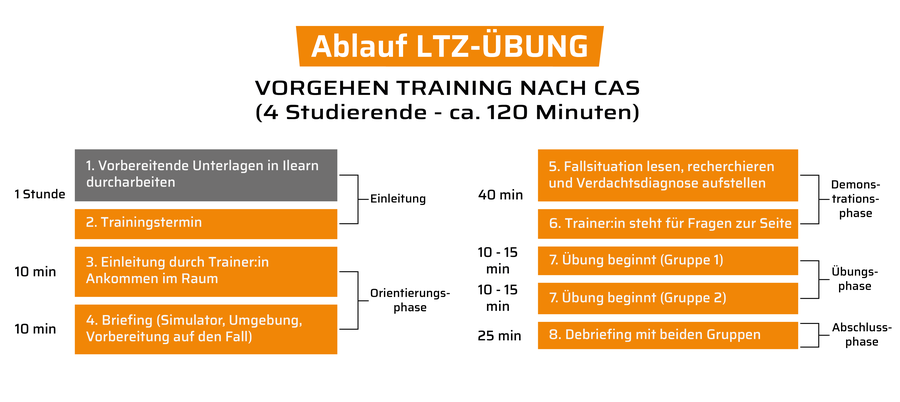
We have developed various scenarios tailored to the level of training and the study contents for the first three years of study. These play out in different settings, i.e. in the acute clinical area, in outpatient or inpatient long-term care and in pediatric nursing. In this way, we pursue the generalist approach of nursing education and prepare students for dealing with nursing recipients and their relatives of all age groups.
Emergency Training
In emergency training, students can practice recognising acute situations from the outset, preventing them and treating any emergency and life-threatening conditions that may have arisen.
Focal points in our simulations are:
- Cooperation in a team
- Design of transfer situations at interfaces
- Maintain an overview of the patient's environment and local conditions
- Early request for specialists
- Reflecting and analysing the situations in the debriefing
- For the implementation of these trainings, Laerdal provides us with the simulation system with ALS Man, Nursing Anne, Resusci Anne, Resusci Baby and the debriefing system.
With these high-quality simulators and aids or working tools from everyday working life, the skills learned can be optimally implemented and trained in the respective situations.
The students prepare for the training day via the DIT's online platform i-Learn.
Immediately before the scenario the students receive an information sheet on the respective simulation situation and can use it to prepare for the briefing for 30 minutes.
During the briefing phase, questions are answered and the last necessary information about the scenario is provided. In the scenario the students are filmed and observed by a lecturer. From the director's seat, another member of staff can take over the speaking role of a simulator, provided that no acting patients are directly involved in the training.
Usually there is another group of students of 4 people each in the room with obversation tasks. These students behave calmly and are only included in the debriefing. In the debriefing, the "active" participants are first allowed to describe their impressions and their problem. The lecturers support the students in reflecting and discussing the problems that have arisen and various possible solutions.
The observers then describe their impressions according to their observation tasks. This information can be taken along by the active participants into the post-processing time as a profitable support.
| Preparation Time | Briefing | Scenario | Debriefing | Follow-up | |||||||||
|
|
|
|
|
Examples of our training:
- Resuscitation trainings according to ERC guidelines
- Emergencies from all areas
- Dealing with relatives in acute emergencies of a patient
- Interface simulations between nursing teams on the ward and incoming REA teams.
faculty positions
Dean
Vice Dean
Dean of Studies
Commissioner for Equal Opportunities for Women in Science and the Arts
- Prof. Dr. Stephanie Hecht
- Deputy Commissioner for Equal Opportunities for Women in Science and the Arts: Prof. Dr. Kathrin Burgmaier
Course coordinators
- Bachelor Emergency Paramedic: Prof. Dr. Mathias Burgmaier
- Bachelor Ergotherapie: Prof. Dr. Patrick Ristau
- Bachelor Management in Health, Social and Rescue Services: Prof. Jasmin Lerach
- Bachelor Management in Rescue Services: Prof. Dr. Susanne Heininger
- Bachelor Management of Inclusion and Participation: Prof. Dr. Christian Rester
- Bachelor Nursing (DE): Prof. Dr. Christian Rester
- Bachelor Nursing (EN+DE): Prof. Denis Bernhard-Banza
- Bachelor Physician Assistant: Prof. Dr. Thiha Aung
- Bachelor Physiotherapy Majoring in Kinesiology: Sebastian Schöppl
- Bachelor Social Work: Prof. Dr. Christian Rester
- Master Mental Health: Prof. Dr. Michael Frey
Course counselling
- Bachelor Emergency Paramedic: Prof. Dr. Mathias Burgmaier
- Bachelor Healthcare Informatics: Prof. Dr. Horst Kunhardt
- Bachelor Management in Health, Social and Rescue Services: Prof. Dr. Susanne Heininger
- Bachelor Management in Rescue Services: Prof. Dr. Susanne Heininger
- Bachelor Management of Inclusion and Participation: Prof. Dr. Christian Rester
- Bachelor Nursing: Prof. Dr. Karsten Gensheimer
- Bachelor Physician Assistant: Prof. Dr. Thiha Aung
- Bachelor Physiotherapy Majoring in Kinesiology: Prof. Dr. Stephanie Hecht
- Bachelor Social Work: Prof. Dr. Christian Rester
- Master Mental Health: Prof. Dr. Michael Frey
Internship administrator
- Bachelor Healthcare Informatics: Prof. Dr. Horst Kunhardt
- Bachelor Management in Health, Social and Rescue Services: Prof. Dr. Thomas Geiß
- Bachelor Nursing: Prof. Dr. Christian Rester
- Bachelor Physician Assistant: Prof. Dr. Thiha Aung
- Bachelor Physiotherapy Majoring in Kinesiology: Prof. Dr. Stephanie Hecht
- Bachelor Social Work: Prof. Dr. Christian Rester
Examination Board
- Master Mental Health, Bachelor Management in Rescue Services, Bachelor Management in Health-, Social- and Rescue Services
- Chairman: Prof. Dr. Michael Frey
- Members: Prof. Dr. Susanne Heininger, Prof. Jasmin Lerach
- Bachelor Emergency Paramedic, Bachelor Nursing (DE), Bachelor Nursing (EN+DE), Bachelor Social Work, Bachelor Management of Inclusion and Participation, Bachelor Ergotherapy, Bachelor Physician Assistant
- Chairman: Prof. Dr. Christian Rester
- Members: Prof. Dr. Mathias Burgmaier, Prof. Dr. Thiha Aung
- Bachelor Physiotherapy dual majoring in Kinesiology
- Chairman: Sebastian Schöppl
- Members: Prof. Dr. Doris Eberhardt, Prof. Dr. Stephanie Hecht
Faculty council
Members ex officio
- Prof. Dr. Christian Rester (Dean)
- Prof. Dr. Susanne Heininger (Vice Dean)
- Prof. Dr. Karsten Gensheimer (Dean of Studies)
- Prof. Dr. Stephanie Hecht (Commissioner for Equal Opportunities for Women in Science and the Arts)
Elected representative of the Professors
- Prof. Dr. Michael Boßle
- Prof. Dr. Kathrin Burgmaier
- Prof. Dr. Mathias Burgmaier
- Prof. Dr. Michael Frey
- Prof. Dr. Fanny Kählke
- Prof. Jasmin Lerach
Elected representative of the academic staff
Elected representative of the students
- Darija Kolbassina
- Eva Obermeier
Secretary
- Faculty assistant: Caroline Brunner-Kandler, Svenja Eckstein
Study assistants
- Bachelor Emergency paramedic: Tassilo Dafinger
- Bachelor Ergotherapy: Vivien Trispel
- Bachelor Management in Health, Social and Rescue Services: Tassilo Dafinger
- Bachelor Management in Rescue Services: Tassilo Dafinger
- Bachelor Management of Inclusion and Participation: Vivien Trispel
- Bachelor Nursing (DE): Nadine Glockner
- Bachelor Nursing (EN): Michaela Fowler
- Bachelor Physician Assistent: Bengisu Alay
- Bachelor Physiotherapy Majoring in Kinesiology: Vivien Trispel
- Bachelor Social Work: Michaela Fowler
- Master Mental Health: Bengisu Alay
